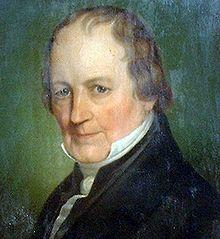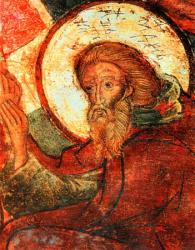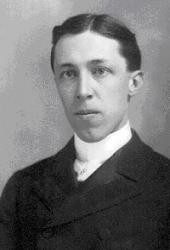Planning worship?
Check out our sister site, ZeteoSearch.org,
for 20+ additional resources related to your search.
- |
User Links
Person Results
Frederic Adolphus Krummacher

1767 - 1845 Person Name: Gräfin Aug. von Egloffstein Author of "Du bist der Weg, die Wahrheit und das Leben" in Jugendharfe Krummacher, Friedrich Adolf, was a native of Tecklenburg, Westphalia, where his father, Friedrich Jacob Krummacher was Burgomaster and Hoffiscal. He was baptized there, July 22, 1767, and apparently born July 13, 1767. In 1786 he entered the University of Lingen (since 1819 ranked as a Gymnasium), and in 1787 that of Halle. After concluding his theological studies in 1789, he was for some time tutor in the family of Senator Meyer in Bremen; was then appointed, in 1790, Conrector of the Gymnasium at Hamm, and in 1793 Rector of the Gymnasium at Mors (Meurs), near Düsseldorf. In the end of 1800 he became Professor of Theology and Eloquence at the Reformed University of Duisburg. When, after the battle of Jena (Oct. 14, 1806), Duisburg was taken from Prussia, the salaries of the professors ceased, but Krummacher lectured on till his audience consisted of one student. He was then, in the autumn of 1807, appointed pastor of Kettwig, on the Ruhr; in 1812 Chief Court Preacher and General Superintendent at Bernburg; and finally, in 1824, he became chief pastor of the St. Ansgarius Church at Bremen. By reason of growing infirmities he resigned his charge in June, 1843, and died at Bremen, April 4, 1845 (0. Kraus, 1879, p. 310; Blätter für Hymnologie, 1886, p. 80, &c).
Krummacher is best known as a preacher; and as the author of the well-known Parabeln, first published in 1805, which passed through many editions, and ranks as the standard German work of its class. His hymns are little suited for church use, being often allegorical and high-flown, and not for the most part sufficiently simple and direct, though in some cases he does write in a popular, natural style, and with a beauty of his own. His hymns mostly appeared in his Festbüchlein, a work consisting of allegorical narratives, conversations, &c, with interspersed hymns. Of this the 1st part, entitled Der Sonntag, was published 1808 (2nd ed. 1810; 3rd ed. 1813; 4th ed. 1819); pt. ii., entitled Das Christfest, in 1810 (2nd ed. 1814; 3rd ed. 1821); and pt. iii., entitled Das Neujahrsfest, in 1819.
Those of Krummacher's hymns translated into English are:—
i. Allgemach aus Dammerung und Nacht. Advent. In his Festbüchlein, pt. ii., 1810 (1814, p. 154), in 5 stanzas of 4 lines, entitled "The Prophets of Nature"; and given after the conversation on Zacharias, the father of St. John the Baptist. Included as No. 34 in J. P. Lange's Deutsches Kirchenliederbuch, Zurich, 1843. The unity of idea is violated by the concluding lines of st. v.
"Wie die leisen Lispel den Propheten
Einst auf Horeb's Felsenspitz umwehten."
And thus in his preface, p. vii., Dr. Lange sug¬gests that st. v. should read thus:—
"Allgemach und siegreich fort und fort
Bricht durch unser Fleisch das ew'ge Wort;
Die Propheten grüsst es durch Gesichte,
Dann wird's Mensch und himmlische Geschichte."
Translated as:—
Slowly, slowly from the caves of night. A full and good tr. from Lange by Dr. Kennedy, as No. 42 in his Hymnologia Christiana, 1863.
ii. Eine Heerde und ein Hirt. Missions. First published in the 3rd. ed., 1821, of pt. ii. of his Festbüchlein, p. 163, in 6 stanzas of 6 lines, at the close of the section on "Israel and the Strangers." In the Berlin Geistliche Lieder Schatz, ed. 1863, No. 1365, and many other recent collections. The translations are:—
1. One, only One, shall be the fold. By Miss Dunn, in her Hymns from the Germany 1857, p. 49.
2. One Shepherd and one fold to be. In Cantica Sanctorum, 1880, No. 96.
iii. Ja furwahr! uns fiihrt mit sanfter Hand. Ps. xxiii. In his Festbüchlein, pt. i. (3rd ed. 1813, p. 118), in 5 stanzas of 4 lines, with Hallelujahs. It is given in the story of the festal rededication of a village church destroyed in time of war, as a choral hymn sung by boys and girls after the Holy Communion. In the Württemberg Gesang-Buch, 1842, No. 72. Translated as:—
1. Yes! our Shepherd leads with gentle hand, Through. A good and full translation by Miss Borthwick, in Hymns from the Land of Luther, 1st Ser., 1854, p. 59 (1884, p. 60), repeated in Kennedy, 1863; Mrs. Brock's Children's Hymn Book, 1881; the Christian Hymn Book, Cincinnati, 1865, and others.
2. Yea! our Shepherd leads, with gentle hand, Along. In full by M. W. Stryker, as No. 164 in his Christian Chorals, 1885.
iv. Hag auch die Liebe weinen. Love, Faith and Hope. Festbüchlein, pt. i., 1808, p. 136, in 3 st. of 4 1., in the section entitled "The Setting Sun," for Sunday evening. It is appended to a story in which the father has been speaking of the Resurrection of Christ the Sun of Righteousness, as celebrated on that day, the hymn being introduced as sung by the family and neighbours, as he ceased to speak. Included in the Württemberg Gesang-Buch, 1842, No. 628. It is most suited to be sung at a choral funeral. Koch, 2nd ed., iv. p. 695, says it was sung at the author's funeral at Bremen, April 10, 1845, and that st. iii. is on the cross over his grave. He adds that stanzas i., iii. were sung July 17, 1850, at the funeral of Dr. August Neander, the church historian in Berlin; followed by an address by Krummacher’s son, Friedrich Wilhelm (author of the well-known Elijah, Elisha and other works). Tr. as:—
Though Love may weep with breaking heart. A good and full translation by Miss Winkworth in her Lyra Germanica, 2nd Ser., 1858, p. 121. Repeated in Flett's Collection, Paisley, 1871, and in H. L. Hastings's Songs of Pilgrimage, 1887.
Other translations are, (1) "Let love weep,—It cometh," by Miss Warner, 1858, p. 584. (2) "Yea, Love may weep when death prevails," by Dr. G. Walker, 1860, p. 57.
A number of other pieces by Krummacher are translated in the Sacred Lyrics from the German, Philadelphia, 1859; by C. T. Brooks, 1847; by Mrs. Follen, 1851, and by Miss Fry, 1859. As they are poems rather than hymns they are not noted here. [Rev. James Mearns, M.A.]
--John Julian, Dictionary of Hymnology (1907)
Frederic Adolphus Krummacher
Sarah E. Taylor
1883 - 1954 Author of "The Divine Light" in Hymns of Grace Taylor, Sarah Ellen. (England, 1883--October 5, 1954). She was born in an English manse, the daughter of a Primitive Methodist clergyman. At nine years of age she came to America. In 1904 she was graduated from Women's College, Brown University. In 1949 she retired after nearly a half century of teaching, which included six years in mission schools at Talladega, Alabama, and Richmond, Virginia.
--The Hymn Society, DNAH Archives
Sarah E. Taylor
Andrew of Crete

660 - 740 Author of "Jesus, hastening for the world to suffer" in Hymnal of the Society of the Companions of the Holy Cross Andrew, St., of Jerusalem, Archbishop of Crete (660-732). born at Damascus; he embraced the monastic life at Jerusalem, whence his name, as above. He was deputed by Theodore, Patriarch of Jerusalem, to attend the 6th General Council at Constantinople (680). He was there ordained deacon, and became Warden of the Orphanage. "During the reign of Philippus Bardesanes (711-714) he was raised by that usurper to the Archiepiscopate of Crete; and shortly afterward was one of the Pseudo-Synod of Constantinople, held under that Emperor's auspices in 712, which condemned the Sixth (Ecumenical Council and restored the Monothelite heresy. At a later period, however, he returned to the faith of the Church and refuted the error into which be had fallen." (Neale). He died in the island of Hierissus, near Mitylene, about 732. Seventeen of his homilies are extant, the best, not unnaturally, being on Titus the bishop of Crete. He is the author of several Canons, Triodia, and Idiomela; the most celebrated being The Great Canon. Whether he was the earliest composer of Canons is doubtful, but no earlier ones than his are extant. Those ascribed to him are:—1. On the Conception of St. Anne; 2. On the Nativity of the Mother of God; 3. The Great Penitential Canon. 4. On the Raising of Lazarus. 5, 6, 7, 8. On the First Days of Holy Week. 9. On the 25th Feast-day between Easter and Pentecost. Fuller biographical details in Diet Christ. Biog., vol. i. pp. 111-12. [Rev. H. Leigh Bennet, M.A.]
-John Julian, Dictionary of Hymnology (1907)
Andrew of Crete
Ernest K. Emurian
1912 - 2004 Author of "God of the Past, the Present and the Future" in Twelve New World Order Hymns Born: February 20, 1912, Philadelphia, Pennsylvania.
Died: January 23, 2004, Alexandria, Virginia.
Buried: Columbia Gardens Cemetery, Arlington, Virginia.
Son of an Armenian immigrant pastor, Emurian attended Davidson College, North Carolina (BA); Union Theological Seminary, Virginia (BD); and Princeton Theological Seminary, New Jersey (ThM). Randolph-Macon College of Virginia also conferred an honorary Doctor of Divinity degree on him in 1971. Emurian served as pastor of the Cherrydale United Methodist Church, Arlington, Virginia, for 19 years, until retiring in 1981. He wrote some 19 books and 60 hymns, as well as hymn tunes, anthems, and popular songs. His works include:
Hymn Festivals
Hymn Stories for Programs
The Living Dramatization of Leonardo Da Vinci’s the Last Supper
Sweetheart of the Civil War
Living Stories of Famous Hymns (Grand Rapids, Michigan: Baker Book House, 1955)
Famous Stories of Inspiring Hymns (Grand Rapids, Michigan: Baker Book House, 1956)
Stories of Christmas Carols, revised and enlarged edition (Grand Rapids, Michigan: Baker Book House, 1958)
Forty Stories of Famous Gospel Songs (Grand Rapids, Michigan: Baker Book House, 1959)
--www.hymntime.com/tch/
===========================
Ernest K. Emurian is pastor of the Elm Avenue Methodist Church, Portsmouth, Virginia. He has served several pastorates in the Methodist Church, chiefly in Virginia. He has long been interested in hymns, and has written several of them, including "When Dawns the Morning Sunlight" in the "Fourteen New Rural Hymns" published by the Society in 1955. He is the author of two volumes entitled "Dramatized Stories of Hymns and Hymn Writers". He had his college work at Davidson College, graduating in 1931.
--Twelve New World Order Hymns, 1958. Used by permission.
===========================
Ernest K. Emurian, a fourth-generation minister, is a graduate of Davidson College, Union Theological Seminary in Virginia, and Princeton Seminary. He has been a Methodist minister since 1936 and is currently pastor of Cherrydale Methodist Church, Arlington, Virginia. He is the author of seventeen books in the fields of hymnody and drama, and of more than thirty hymns. A member of ASCAP, he is the composer of hymn tunes, and sacred and secular songs. His hymn "We Dedicate This Temple" is in The Armed Forces Hymnal and The Presbyterian Hymnal. He lectures widely on Practical Hymnology and Religious Drama, and as an after-dinner speaker addresses conventions and conferences in many states.
----Twelve New Lord’s Day Hymns, 1968. Used by permission.
Ernest K. Emurian
Ferdinand Q. Blanchard

1876 - 1968 Author of "Clear o'er the hills ring out the glad hosannas" in New Worship and Song Blanchard was born on July 12 in Jersey City, NJ. He attended Amherst College (AB 1898) and Yale Divinity School (BD 1901). He was ordained as a Congregational minister and pastored churches in Southington, Connecticut (1901-04); East Orange, New Jersey (1904-15); and at the Euclid Avenue Congregational Church, Cleveland, Ohio, from 1915 until retirement. He died on July 2, 1968 in Cleveland Heights, Ohio.
Sources:
Hughes, p. 317
Reynolds, p. 253
Stuber, p. 396
NN, Hymnary. Source: http//www.hymntime.com/tch/bio/b/l/a/blanchard_fq.htm
Ferdinand Q. Blanchard
George Khūrī
b. 1901 Person Name: جورج خوري Author of "في حضرة الله اسجدي يا نفسي" in كتاب الترانيم الروحية للكنائس الإنجيلية جورج خوري
George Khūrī


 My Starred Hymns
My Starred Hymns

